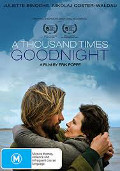
Directed by
Erik Poppe
117 minutes
Rated M
Reviewed by
Sharon Hurst

Thousand Times Goodnight, A
Synopsis: Rebecca (Juliette Binoche) is one of the world’s leading war photographers. On assignment in Kabul she is badly injured. She is taken by her husband, Marcus (Nicolaj Coster-Waldau) back to her home in Ireland where two daughters Stephanie (Lauryn Canny) and Lisa (Adriana Cramer Curtis) anxiously await their mother’s return. Marcus presents her with an ultimatum: he and the girls cannot live with the constant stress and uncertainty. Either she must renounce her career or the marriage is over.
Norwegian director Erik Poppe has himself covered war-torn areas as a photographer and the swag of awards and nominations for this film (including ecumenical awards for its compassion) are testament to its strength and authenticity. I’d have loved it regardless, so strong is the script, so real the emotions, and so compelling is the acting by the four leads.
From a story by Poppe, Harald Resenlow Eeg has crafted a gripping script, powerfully contrasting in its elements – from the theatre of war through to the so-called normalities of domestic life and the love contained within this fraught family. So many thoughtful and vexatious themes emerge from the story: the importance of a career versus family and whether they can ever be reconciled; the role of parental responsibility; the forces behind such driven people - their social and political commitment as opposed to the gratification of adrenaline addiction; along with the broader issues of suicide bombing and the West arm's length perspective of Third World conflict. The film is splendidly shot on location in Ireland, Afghanistan and Kenya and a stirring and haunting string-based score heightens the film’s impact, even if at times it is a touch overused.
The structure and crafting of this film which foregrounds the role of dedicated photographers and journalists in bringing to the world’s attention the plight of people in war-torn countries are truly impressive. The transfixing opening scene, silently focussing on shafts of light, an eye filling the screen, and then what seems to be a funeral ritual but is revealed to be something far more sinister, is unforgettable. The subsequent mayhem wreaked on the streets of Kabul and later in Kenya, it is worthy of any action film, but freighted with a more serious underlying purpose.
Fear is palpable, both for Rebecca and for the victims of conflict, yet the personal fear harboured by her family for a mother’s safety is just as real. In the domestic scenes in which Rebecca tries to live a “normal” life there is also intense emotion – both joy and pain stemming from the upheaval this woman’s career path causes for all. The two daughters and their relationship with Rebecca are poignantly and sensitively portrayed whilst the dynamic between husband and wife feels truthful in all its paradoxical complexity.
It’s hard to find words to convey the power of Binoche’s performance. When she explains to Stephanie telling she has chosen this line of work, we feel the anger as well as the passion and total commitment. And when Rebecca confesses her failings as a mother we feel it to the core and the underlying sadness contained in this relationship of deep love between husband and wife is a heartbreak.
It’s gruelling but uplifting to see such a strong and thought-provoking film dealing with important issues on a global and personal scale. Bring on more like this, I say!

Want more about this film?


Want something different?




